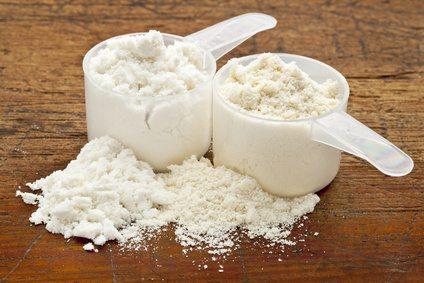October 22, 2018
Anju Mobin
Studies Favour Whey Protein Over Soy for Muscle Building

The debate over which protein – whey or soy – is better is finally settling down, and if the findings of research and studies are anything to go by, whey protein has an edge. Whey is the water-soluble portion in milk, which means it is an animal-based protein, whereas soy comes from plants. While there are several parameters to judge the performance of both these supplements, for the scope of this post, we will restrict it the impact they have on weight loss, muscle building, and testosterone levels.
Whey Vs Soy For Weight Loss

Increasing the consumption of protein to supplement weight loss has long been a potent strategy by dieticians and bodybuilders. However, it is essential to consume the right kind of protein. In the light of recent studies, it looks like whey protein has a definitive win over soy in the weight loss sector.
Several studies have shown that whey helps cut body fat, whereas soy has minimal impact on the same. In a study conducted by the Beltsville Human Nutrition Research Center, USDA, Beltsville, using 90 overweight or obese participants, those who simply consumed whey protein supplement twice a day without any other changes to their diet experienced weight and fat loss. The participants who consumed soy had no impact on their weight. Whey has also been proven to increase lean body mass better as compared to other sources of protein including soy. In essence, whey protein supports weight and fat loss much better than soy and other kinds of protein.
Whey Vs Soy For Muscle Building

Since whey is digested and absorbed faster by the body, it has been proven to stimulate a high muscle growth and repair rate, which makes it an ideal option for workout and training sessions. Numerous studies have shown that whey is a better muscle-builder as compared to soy or casein.
In a study conducted by The Human Performance Laboratory, Department of Kinesiology, University of Connecticut, whey protein was recorded to be higher in leucine, absorbed quicker and resulted in a more pronounced increase in muscle protein synthesis.
Whey vs Soy: The Testosterone Effects

Whey protein has shown to boost testosterone in a few studies; however, the verdict on the same is not unanimous in the academic circles. What is certain is that soy leads to reduced testosterone levels, possibly due to a compound call genistein, which mimics the effects of estrogen.
In addition to this, a study, which was conducted with 10 male athletes, found that whey also inhibits the levels of cortisol, which hampers muscle recovery and weakens immunity. While more research needs to be undertaken to prove a positive relationship between whey and testosterone levels, it sure has no negative impact. The same cannot be said for soy, which might prohibit the production of this important hormone that stimulates muscle growth, maintain libido, and helps elevate mood.
Whey-ing Your Options

Soy might have gotten some negative publicity recently, but that doesn’t mean it’s actually bad for your health. It might not be as potent as whey in cutting flab or building muscles, but its overall impact on the human body, especially the heart and cholesterol levels, is rather beneficial. Soy has been an integral complement of diets in several Asian countries for generations. It also has high levels of fibres, minerals, and vitamins, in addition to being a more environmental-friendly option.
However, for the sake of specific results like muscle building and weight loss, whey has emerged to be a better choice. As mentioned before, this is partly in due to whey’s fast-acting nature, which allows it to be digested and absorbed quickly. Whey has also shown to reduce the fat content in the liver, in addition to being more palatable than soy.
Whey And Soy: Final Thoughts

Given the fact that whey does have the upper hand in terms of shedding fat, building muscles, and not interfering with testosterone levels, it is definitely the best choice for bodybuilders. But since whey is a dairy product and contains lactose, it is not a viable option for some people, such as vegans or individuals who are lactose intolerant. Whey has only recently become a mainstream protein supplement though it has long been used exclusively by bodybuilders and trainers.
But, soy supplements tend to be cheaper than whey protein powders. If you are specifically looking for a lactose-free, plant-based protein, soy is a good bet. Invest in a quality protein supplement that serves the purpose you want to achieve and consume it regularly - in the right quantity and at the right time in order to see the best results.
 Follow our Instagram page for the latest updates: badalkhudko
Follow our Instagram page for the latest updates: badalkhudko











Comments
Leave a comment